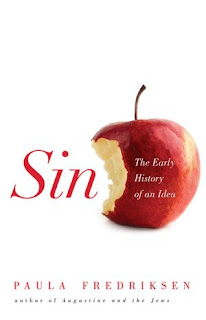 King of the Jews; Augustine and the Jews: A Christian Defense of Jews and Judaism; and, most recently, Sin: The Early History of an Idea.
King of the Jews; Augustine and the Jews: A Christian Defense of Jews and Judaism; and, most recently, Sin: The Early History of an Idea.Not so long ago I asked her what she was reading. Her reply:
I usually read several books at once. Two that I recently finished are by Carlo Levi and by Sebastian Junger.Learn more about Sin: The Early History of an Idea at the Princeton University Press website.
A dear friend, for my birthday, surprised me with a new copy of Christ Stopped at Eboli, by Carlo Levi. I had first read it as a college undergraduate, years ago. Now, after decades of historical work in ancient Mediterranean culture, I was able to savor this memoir of political exile so much more. Levi’s clear and beautiful writing, lyrically translated by Frances Frenaye, captures everything. The sight and smells of this isolated southern Italian landscape. The social pretensions and varying degrees of desperation that structure lives lived too close together in a tiny, impoverished town near the Gulf of Taranto. The way that skinny goats and half-starved dogs move in the airless heat.The silver-green of ancient olive trees, the smell of dust and lemons. Stone houses; stone walls; stone earth. And, most heartbreakingly of all, stone people: the ancient, patient, bitterly poor peasants upon whose stooped backs the town’s tiny bourgeoisie rests. Like shadows, their silent presence haunts the town (and the book) as they labor continually, dragged down and defeated, dressed always in black as if mourning their own lives.
The name of this town is not Eboli, a fact that gives the title that much more poignancy. Levi spent his year of exile in Gagliano. Eboli, with its good train service, lay some eighty miles to the Northwest. Not even Christ, murmurs Levi’s title, could journey as far south as Gagliano. And so the peasants practice ancient magic as they live in the flattened landscape of their own poverty, a landscape thickly animated by spirits, demons, the souls of the restless dead. Levi captures the sheer timelessness of their condition: this was how it was under Mussolini; this was how it was under Augustus, too. A beautiful book.
A beautiful book in a different way: Sebastian Junger’s War. Junger sets his narrative in the hostile moonscape of Afghanistan’s Korengal Valley between June 2007 and June 2008, when he lived with the men of Battle Company. Fear, Killing, and Love, the three strophes ofhis story, both structure his presentation and shape the experience of the men whose battles he chronicles. No clutter in Junger’s prose, nor sentimentality. His descriptions of the experience of fear under fire left me with sweaty hands, hardly able to breath, wondering how the hell does anybody tolerate this without going insane? Junger delivers his answer in his next two sections. First, battle means killing. And killing at this sort of close quarters, getting to someone while they’re hell-bent on getting to you, is a high: an adrenaline-rush testosterone-ripped ecstatic affirmation of (your own precious) life over death. Second, battle means love, the strong bonds forged when fighting, when everyone depends on everyone else in the platoon, and when, sometimes, in the split-second that you have to make the decision, your friend’s life, your men’s lives, mean more to you than your own. Simply out of respect for what our soldiers have been going through in this rotten, wasted war, you should read this book.
The Page 99 Test: Sin: The Early History of an Idea.
--Marshal Zeringue




